For Alex Braverman, the love of hockey runs deep. As a real estate agent for over 25 years, he has a long list of clients, particularly in the hockey community, such as the late Pavol Demitra and Florida Panthers captain Aleksander Barkov.
His company, Play It Abroad Inc., has supported bringing over 20 teams from Russia, Slovakia, the Czech Republic and France to America to participate in hockey tournaments. Some players have gone on to play in the KHL. His son, Michael, started playing at the age of seven and made the Jr. Panthers team. From that point on, that’s where his passion for the game would continue to grow. Previous Panthers’ leadership assigned him as International Team Consultant.
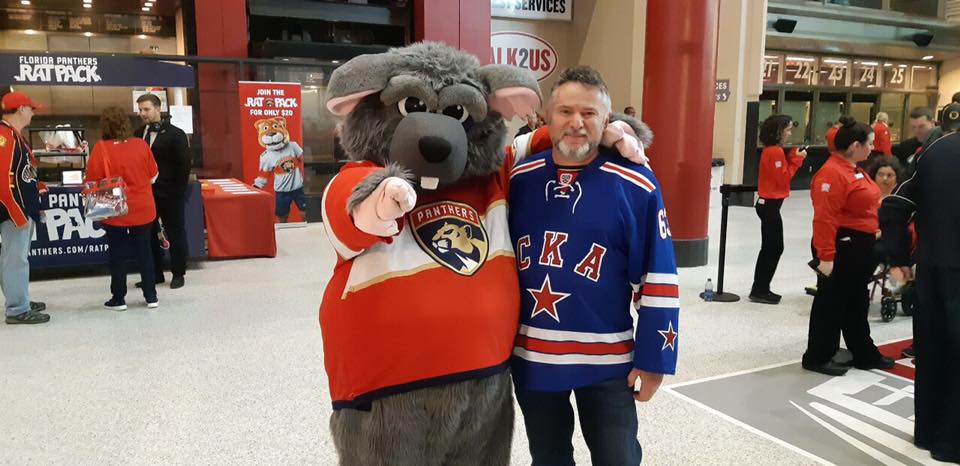
Braverman had seen an article by Clarence “Slava” Paller that highlighted Evgenii Dadonov (who was in the Panthers system at the time) as a contributor for the Professional Hockey Players Association, a union that serves for the AHL and ECHL. Paller mentioned his connections in the hockey community as well. They both began to bond over hockey and their Russian roots.
Slava eventually came in contact with Steven Wong, an Ontario-based filmmaker, businessman and OJHL coach. Wong is also the chief operating officer of the synthetic ice company Can-Ice. The two were working on a deal and Paller introduced him to Stanley Cup champion Andrei Vasilevskiy who is a big fan of their product.
The passion and love for the game that all three possessed grew even more and their paths crossed for one collective goal – highlighting the significance that Russia has had on the game of hockey with the Russian Heritage Night. But it’s not just Russia, it’s countries that were once part of the former Soviet Union like Belarus, Ukraine, Kazakhstan, Moldova and Estonia. They provide the hope that they could be nations to help continue to expand the game.
The Vision Coming to Life
The event has been around for three years and has been gaining more traction since its inaugural year in 2018. The event itself highlights the impact the Russian community has had on the growth of the game. With the game being so close to Braverman, he knew he wanted to do more.
“I started it because I love hockey, my son was playing hockey,” Braverman said who is the founder of the event. “We started in Florida when the Panthers were playing the Washington Capitals and both teams had a lot of Russian players on the roster.
“It was one game and it grew to five the next season with Slava’s (Clarence) help and now 10 games this year… It’s not only a win for the fans, it’s a win for the kids.”
What started off as a small event has grown into something bigger where passionate fans of one of the world’s top teams can come together and celebrate. After all three met, and already with a lot of contacts in the hockey and Russian community, Braverman, Paller and Wong were building the foundation for an event where they wanted to highlight the same passion for the game that they have. It was all out of the love for the game.
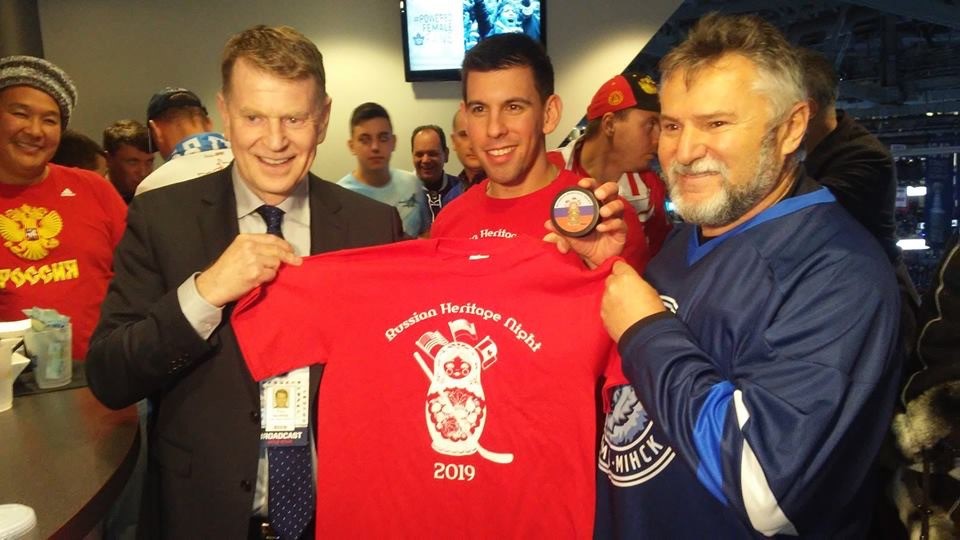
“It was years in the making,” Paller said who is the director of marketing, communications and public relations for the event. “It was a very simple formula but it was really well executed. Because we were very known in the Russian community, we were able to get a lot of people to jump on board.”
One of those to quickly jump on board was Wong.
“I’ve seen what they’ve been doing, ever since I’ve met them,” Wong said, who serves as CEO and director of strategies and business ops for the RHN. After coming in contact with Braverman through noted Russian hockey agent Dan Milstein he knew that this event would become something special.
“I’ve been watching them and I’ve been watching RHN grow and grow and grow and it got to a point where it was undeniable. The movement that you have going here, the momentum, is incredible. Alex can pick up the phone and the next thing you know he’s got (Alex) Ovechkin coming out.”
The list of connections continued to grow. That led Wong to become a part of the main group in expanding the event and being part of the brand. “The foundation that they (Braverman and Paller) already paved is so solid. When the three of us put our minds together, I’m really looking forward to what 2021 brings.”
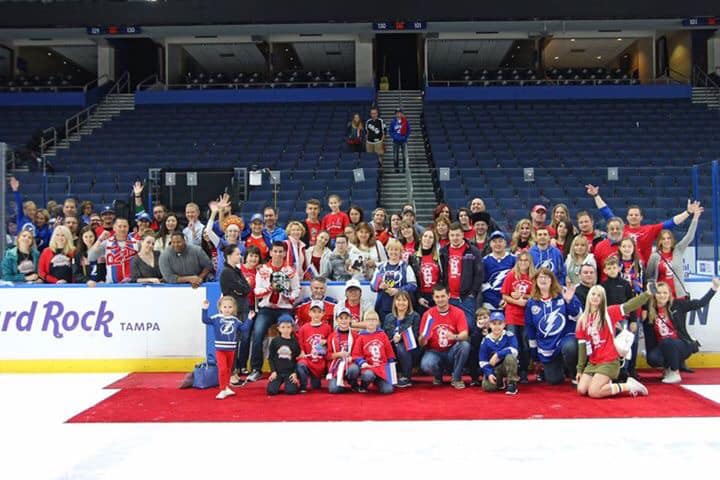
It’s a challenge considering that the future of hockey is uncertain with the ongoing COVID-19 pandemic. But even so, that isn’t stopping the trio from putting forth the effort to keep this event going strong. But before the pandemic, things were going according to plan as they were in contact with a number of NHL teams.
“Each team has different requirements,” Braverman explained. “If we get the NHL on board it would be much easier to do it… Our vision is to make it much bigger, not only about sport but about culture, some business showcase to see that we’re all the same and we all love hockey.”
The Culture and Support from the Community
With events in Detroit, New Jersey and Brooklyn the culture was alive and well. On display, there was traditional Russian folk dancing along with music, costumes and attire during the intermission of the games. The reception wasn’t only positive among Russian fans but hockey fans alike cheered and gave praise on how wonderful the performances were.
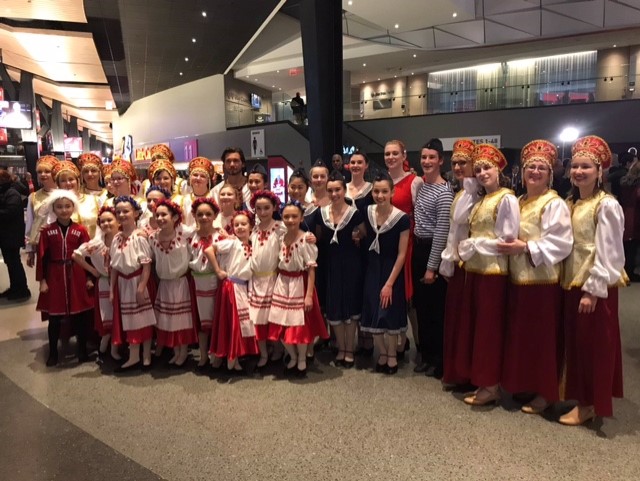
If that wasn’t enough, a robot was brought to a Devils’ game when the Pittsburgh Penguins were in town before the season was put on pause. A humanoid- robot, made by Promobot Corp, greeted and interacted with fans inside the arena. It has the highest AI technology as it shows the technological advancements of the Russian community.
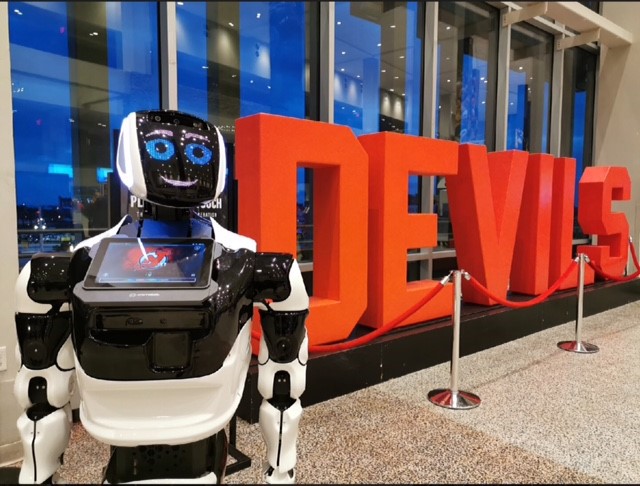
Film is also a main focal point, as a movie was made in honor of Yaroslavl Lokomotiv captain Ivan Tkachenko to highlight his charitable work. The film was titled ‘Captain Nemo’ and the RHN organized the premiering of the film in the United States and Israel. A second movie is in the works about the whole team is set to premiere next year, 10 years since the tragic event occurred.
The growth, culture and community are becoming something much more. By getting the alumni to be apart of it, is definitely a great way to grow the event. There were kids skate programs with Mikhail Grabovski, Alexei Ponikarovsky, Valeri Bure and Vitaly Vishnevsky in Toronto, Florida and Los Angeles. But it was nice to get some of the bigger names in the Russian community including Pavel Bure and Slava Fetisov. They’ve even reached out to prospects like Yegor Zamula of the Philadelphia Flyers to help reach the younger audience.
“They’re (the legends) all part of the history,” Paller said. “They paved the way, we want to honour their roots… They lead the path for the young generation. If you remember in Ovechkin’s early days, he got to play with Sergei Fedorov. It’s very important we bring them in and highlight them to make it really about them.”
“It’s about blending the past, the present and the future and we put it all together into the now. And that’s why it’s so big, we like to unite all cultures.”
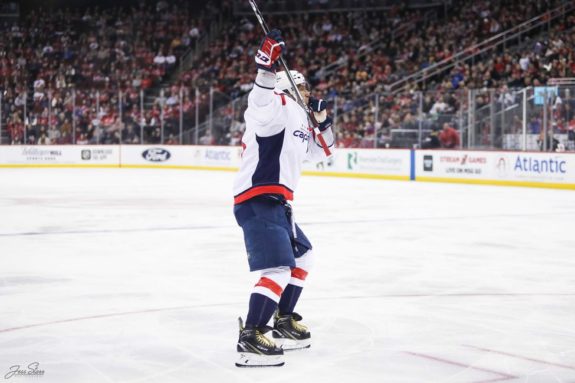
“It’s huge. That was our goal from the beginning,” Braverman said of the support. “Slava Fetisov shot a few different videos supporting us in English and in Russian. (Alex) Ovechkin currently said he would like to see the Russian Heritage Night in Washington, D.C. and he would like to see the Russian ambassador go on the ice and do the ceremonial puck drop. The sky is the limit.”
That support from the players is continuing to grow. Former NHLer Nikolai Antropov is serving as an ambassador for the event. The event is even expanding to other big-name Russians. The game resonates with UFC fighter Alexei Oleynik and tennis superstar Maria Sharapova as well as prominent Russian movie stars.
That support has given them more of an opportunity to increase the brand, the event, and expand it to other areas of major prominence.
“These big celebrities, big stars, big Russian moguls, they have so much that they want to do to and give back as well,” Wong stated. “This is a great opportunity because our reach is so much bigger than just hockey. That’s why we rebranded Russian Heritage Network.”
With that new rebrand, they’ve had developed new partnerships along with a new logo and designs from someone in connection with the UFC. Wong adds that with the steps they’re taking, they’re aiming to give back to the community and growing the movement.
Something like this is what Paller wants to bring to the forefront of the heritage event by showcasing the talent of the Russian community. But, there’s a bigger goal in mind, unite those affected by the past tensions after the fall of the Soviet Union.
“What we’re trying to do is help show that we’re all the same,” Paller said. “The way that we can come together is by understanding and embracing each other and seeing it from a new light.”
“What this world needs is uniting and that’s what we’re trying to do.”
A Chance to Continue to Expand the Game
While the brand and newly named Russian Heritage Network is beginning to expand and emphasize the Russian culture, that isn’t the only thing hoping to take off from these events.
These events serve as a great opportunity to expand the game of hockey and find the next NHL star in an area where hockey isn’t as prominent. We’ve seen Antropov (Kazakhstan, 465 points) and Ponikarovsky (Ukraine, 323 points) come from areas where players who made the jump to the NHL are very scarce. Sandis Ozolinsh helped put Latvia on the map after recording 564 points in the NHL. Now, we’ve seen Teddy Blueger, Zemgus Girgensons and even Rudolfs Balcers become NHLers.
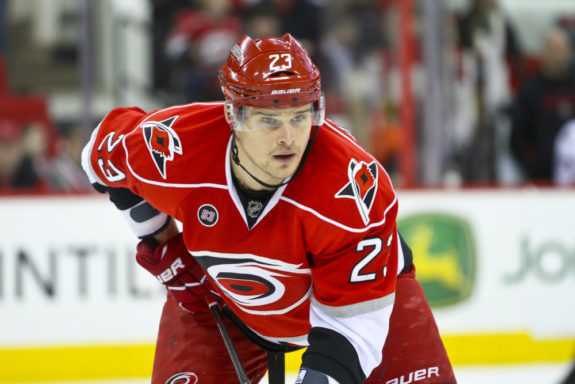
While Paller was working for LGFG Fashion House, a Canadian suit company where the main headquarters was moved to Estonia, the NHL played an international game with the Panthers and Winnipeg Jets. Paller was able to help get a group of kids to attend the game and see their very first NHL game. With his contacts, along with the CEO Dimitry Toukcher and Braverman, gave them the gift of a lifetime.
“Those kids would never, ever, get to see an NHL game,” Paller recalled. “What we were able to do is make the biggest gift to these kids where we brought kids from Estonia, to this game and to meet the players… It’s something that these kids will remember for the rest of their life.”
Wong recalled his experience with both NHL games that were being played in China between the Boston Bruins against the Calgary Flames and the LA Kings and Vancouver Canucks. The KHL expanded their league to China with the Kunlun Red Star starting their inaugural season in 2016-17. Now, they have former NHLer and Stanley Cup winner Alexei Kovalev as the head coach. This signifies that the international growth is a major step to grow the game.
“It’s such an international game,” Wong stated. “Even in the GTHL here where my son plays, we’re getting players from Russia and China, from all over the world. They’re all coming to play in this league because hockey has such a reach now. That’s what the NHL should be doing and I do hope to see it in other countries within Russia and abroad.”
Wong also adds that those U15 and U16 years are becoming more important for those players. A recent conversation with a high-level coach in Colorado supports the growth of the game.
“This coach runs a very, very strong team and they do very well in tournaments,” he explained. “A team came from China to play and they basically thought they were going polish them off. They end up losing 9-1. The level of skill abroad now is very, very impressive.”
Wong even talked to former Chicago Blackhawk and two-time Stanley Cup champion Kris Versteeg. Versteeg recalls about his son’s team where a six-year-old player is on the ice nine times a week. It’s easy to assume that Versteeg was impressed by just how much this player is putting in the time and effort.
“The only way to catch up (to other sports) is global expansion… It’s a very exciting time for hockey.”
This is a big reason why Wong is a part of the RHN. The reach, the audience, and potential to continue to grow the game resonates with him, as he’s a big fan of the culture and heritage that Russia presents.
The Future
As the event continues to reach the audience in nations that were once part of the Soviet Union, the belief is that they hope to see one of the next NHL superstars come from one of those countries.
“Yes. It’s very possible,” Braverman stated.
“It’s not a matter of if, it’s a matter of when.” Wong stressed. “It’s going to happen.”
“There are players coming from everywhere,” Paller added. “We’re starting to see that with these countries.”
Short answers, but to the point. Their hopes are high that with what they’re doing it can reach to players in those countries and beyond.
The main goal of the Russian Heritage Network was to grow, expand and bring the game to a place where no one thought possible. By highlighting the importance of Russian heritage, they created an opportunity for those who thought that hockey was out of their reach, but could be a possibility for their future.
The road to reaching the NHL is difficult. But with the help of Braverman, Paller and Wong, there is a chance that we can see more players come from lesser-known nations. It would be even more exciting if we get to see the next superstar in the making.